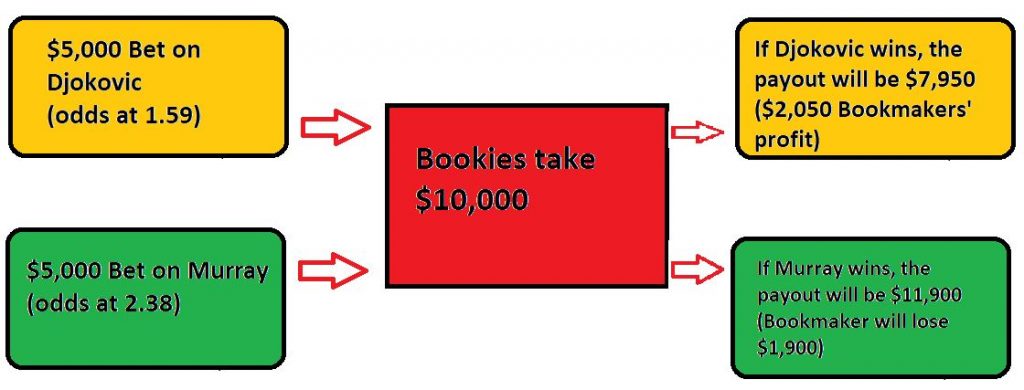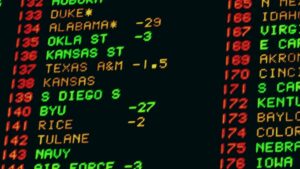Are you new to sports betting? Then, most probably, you’ve heard of the saying “You’ll never meet a poor bookmaker”. Many individuals also question if bookmakers always win. While regularly generating a profit is tough to “beat the bookies”, it is possible. So, how do bookies make a lot of money and how much do they make? How can they constantly keep one step ahead of the game by stacking the betting odds in their favor?
In this post, we’ll explain how bookmakers benefit from punters who bet on sports. How much do bookies make? We’ll also give you some estimates on how much money some of the industry’s giants make in a regular year at best online betting site.
What Is A Bookmaker?
Bookmaker, a.k.a bookies, is someone who accepts and pays out bets from gamblers, usually through online platforms.
The online betting in trusted online betting site platforms are referred to as the “book”.For the sake of this post, let’s assume that the bookmaker and the book owner are two separate entities. This is because many betting websites employ many bookmakers as sportsbook agents.

What Methods Do Bookmakers Use to Accept Bets?
Bookies must have a platform as well as odds/lines to accept bets. The majority of bookies we’ve encountered employ online “pay per head” services. These services provide sharp betting odds and client management systems to the bookmaker. As a result, it allows gamblers to place bets online.
So, how do bookies make money?
How Do Bookies Make A Lot Of Money In Sports Betting?
One of the most tempting parts of sports betting at top online betting site is the possibility of making a continuous profit. You must know what you’re doing and employ the appropriate tactics, but it is possible. In the long term, however, the majority of bettors lose money. There are various reasons for this, one of which is that bookmaker uses particular strategies to ensure that they are constantly in the lead.
Overcoming this edge is the key to successful sports betting. Besides, bookmakers are your adversaries. That is why you must learn how to defeat them. Before you can accomplish that, you must first comprehend how do bookies make a lot of money in sports betting.
So, how do the bookmakers make their money?
Below are the ways how bookmakers earn profits in sports gambling:
- Bookmakers determine the appropriate bet pricing (the vig).
- They usually change and set the betting lines.
- Bookies make a lot of money by balancing the book and eliminating risk.
- Bookmakers are also using the emotions and lack of knowledge of bettors as a strategy.
What are the fundamental principles of bookmaking?
The fundamental idea of bookmaking is simple and self-evident. A bookmaker takes money in every time a punter places a wager. Then, they pay money out whenever a customer wins a bet. Moreover, their goal is to bring in more money than paying out. Therefore, making sure that this happens is the art of bookmaking.

Bookmakers do not influence the outcome of sporting events. Yet, they do have power over the amount of money they stand to earn or lose on any given conclusion. Furthermore, they establish the odds for all of the bets they place, allowing them to make a profit.
In addition, bookmakers benefit by shifting the odds in their favor. It means that they wager to overround percentages on the vast majority of athletic events. So, what is overround and how do bookies make a lot of money by charging vigorish (vig).
Charging Vigorish/The Overround: How do bookies make money?
Vigorish (vig) is popularly known as juice, overround, or margin. The use of vigorish is the most common method used by bookmakers to tilt the odds in their favor. It is embedded into the odds established by bookmakers to assist them in making a profit.
In essence, the vig is a fee for placing bets. We’ll use the example of a coin toss to demonstrate how vig works.
How does vigorish work?
A coin toss has two possible outcomes, both of which are equally likely. Thus, there is a 50% chance of getting heads and a 50% probability of getting tails. Therefore, if a bookmaker gives even money on a coin flip, it means they were also giving actual odds.
In decimal odds, this is 2.00, +100 in moneyline odds, and 1/1 in fractional odds. A winning $10 bet at even money delivers $20, which includes the $10 profit plus the initial risk.
Let’s assume this bookmaker had 100 clients and each of them is betting $10 on a coin toss. Half of these punters are betting tails while the other half betting heads. In this case, the bookmaker stands to lose all of his money.
The bookies are raking in a total of $1,000 in wagers. However, they must also pay out a total of $1,000 in prizes, regardless of the outcome. This is not a favorable situation, as they are in business to generate money.
For this reason, they introduce vig into the odds. Bookmakers need to make sure that they will profit regardless of the outcome, at least hypothetically. Therefore, when two outcomes are equally likely to happen, bookies frequently use these odds:
- 1.9091 decimal odds
- -110 moneyline odds
- 10/11 fractional odds
How do bookies make a lot of money using vig?

Using the coin toss as an example, the chances on heads and tails would remain the same. However, the odds on heads would now be 1.9091. This indicates that a winning $10 bet would net you $19.09.
Let’s see how it works out for the bookmaker today, with 50 clients betting on tails and 50 on heads.
As you can see, the adjustment in odds had a significant effect. Moreover, the bookmaker has now assured a profit on every coin flip. The total amount they payout will always be $954.50, based on the $1,000 in total wagers collected. Furthermore, the vigorish is their built-in profit margin of $45.50. Usually, this profit is stated as a percentage of the total wagers received. So, in this scenario, the overround is around 4.5 percent.
This is a simple example, but somehow it illustrates how bookmakers manipulate the odds to get an edge. However, when it comes to sporting events, things get a little more difficult. This is because the alternative outcomes aren’t always equally likely. Besides, many betting markets have more than two possible outcomes. In addition, the bookmakers don’t always accept the same amount of money on all possible outcomes.
As a result, generating money as a bookmaker is more complicated than merely charging vig. Other strategies are necessary to assure continuous profitability, which is where odds compilers come into play.
Odds Compilers: How do bookies make a lot of money?
Bookmakers’ odds are established by odds compilers. They are also known as merchants, and they play an extremely important role. The odds they set will ultimately decide how much money a bookmaker will make as well as how much money they will take in. In sports betting, pricing the market is the process of determining the odds for any sporting event.
When it comes to pricing up markets for sporting events, there are several factors to consider. The main aim is to ensure that the odds appropriately represent the likelihood of any given result. At the same time, to ensure that there is a profit margin built-in.
Oftentimes, statistics are used to determine the likelihood of outcomes. But in many cases, a certain bit of sports expertise is also a must.
Thus, odds compilers must be quite educated in the sports for which they are pricing markets. As a result, people frequently focus on only one or two. They must also have a firm grasp of a variety of mathematical and statistical ideas.
How does the odds compiler work?
Consider how a market for a tennis match between Novak Djokovic and Andy Murray may be priced by a compiler. In this match, the abilities of these two players are so similar. Therefore, the compiler needs to evaluate a variety of criteria. They’d consider current form and each player’s recognized capabilities on the appropriate playing surface, for example. They would also consider the outcomes of previous meetings.
They could get to the conclusion that Djokovic has a 60% probability of winning the match and Murray has a 40% chance based on all of these considerations. As a result, Djokovic has odds of 1.67 and Murray has odds of 2.50, which roughly represent their prospects.
These odds do not include any vig, which must be factored in as well.
Compilers, on the whole, have a target margin. This might vary a lot for a variety of reasons. So, let’s say that the compiler wants a margin of roughly 5% in this situation. Then, they would cut each player’s odds by 5%. As a result, this makes Djokovic’s odds 1.59 and Murray’s odds 2.38.
The bookmaker’s margin is derived by multiplying the reciprocal of all potential outcomes. Then, translating the result to a percentage. There are two possible outcomes in this instance, and the following equation would be employed.
MARGIN = (1/1.59) + (1/2.38) = 1.05 = 105%
As you can see, the compiler met its goal of a 5% margin. However, the task isn’t done yet. Compilers must also ensure that a bookmaker’s book is balanced.
How do bookmakers create a balanced book?
When a bookie has a balanced book on a market, he stands to profit roughly the same regardless of the outcome. The outcome of an unbalanced book would have an impact on the amount of money made. Moreover, it may even end in a loss. For obvious reasons, a balanced book is normally preferred, and odds compilers strive for it.
Using the tennis match scenario as an example, a balanced book might look like this.
As you can see, the bookmaker stands to profit around $500 regardless of the outcome, depending on $10,000 in total bets. This is the 5-percentage-point profit margin that has been set as a goal. Consider what would happen if the $10,000 in total bets were evenly distributed between both players.
Do bookies make a lot of money in an unbalanced book?

The bookmaker is dealing with an unbalanced book in this situation. If Djokovic wins, bookies will benefit. Otherwise, he will lose money when Murray wins. It’s typically something you want to avoid.
This explains why sports betting odds change over time. Odds compilers will alter them regularly to keep their book balanced. They may, for example, raise the chances on Djokovic to encourage more betting on his victory. Alternatively, bookies may also lower the odds on Murray to discourage more bets on his victory in the scenario above. They may even be able to perform both tasks.
Although no assurance altering the odds will always result in a balanced book, it almost always does. Besides, this is one of the reasons why bookies place such a high value on the number of bets placed. More money coming in, on average, implies they’re more likely to get the balance right. It’s extremely unusual to achieve perfect market equilibrium. Then again, the idea is to get as near as feasible.
Moreover, it’s worth remembering that odds compilers occasionally prefer an unbalanced book. If they are certain in a specific conclusion, they will endeavor to set up a scenario in which they will earn the most if it occurs.
How to Make a Profitable Bet at the Best Sportsbook in Singapore?
Why do I always lose? Can you lose money on a winning bet? Or, how to make money from betting without losing?
You most probably asked these questions yourself. Nonetheless, can you genuinely “beat the bookie” now that you understand the bookmaker’s business model? Since you learn how they build in a margin to earn a profit, win or lose, your problem now is how to make a profitable bet.
How to beat the bookies?
To win against the bookmaker, you must do your homework and understand your chosen sport from inside and out. Furthermore, you must have a more strategic betting game to help you score more wins than losses. Also, play a longer game for more fun and more consistent wins over time.
How do bookies make a lot of money and why do they often offer promotions?
How do they generate money and why would bookmakers give promos? In other words, if a bookmaker’s goal is to earn money, why would it give generous promotion?
This question often comes from punters who are skeptical about bonuses and promotions in general. Yet, they can’t understand how they may deliver value without plenty of other hidden terms and conditions that make it unworthy of your time.
Before we go any further, we are aware that certain promotions are wolves in sheep’s clothing, with little value and deceptive titles. That is why, before taking advantage of the promos, go over all of the terms and conditions of each promotion.
Having said that, there’s no need to be negative in general. Competition is one of the reasons why bookmakers offer promotions and bonuses. They’re ready to risk a tiny amount of money on a free bet since there’s so much competition out there.
Because of this, bookies consider excellent promotions as an investment. They hope it will help to retain their long-term and loyal consumer to continue betting on their sportsbook.
Why do people bet on sports when you cannot beat the bookies?
People enjoy betting on sports for a variety of reasons. Here are a few of the advantages of sports betting:
- Entertainment value
- A chance to make money
- Cheap fun
- Convenience
- Easy to get started







